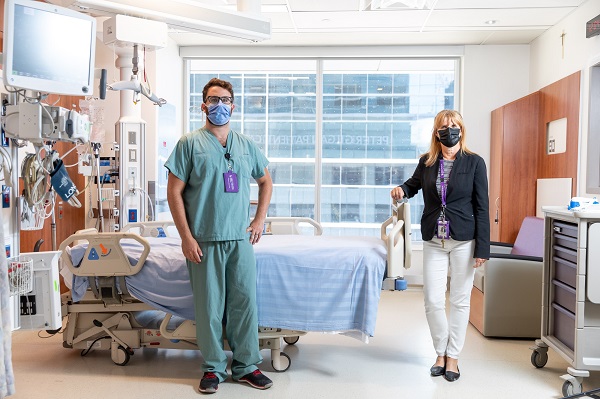By Ana Gajic
As severe nursing shortages challenge hospitals across Ontario, a program at Unity Health Toronto is paying nurses to become specialized in critical care, helping to advance their careers and fill an urgent need.
The Critical Care Sponsorship Program supports experienced registered nurses (RNs) to become accredited in critical care nursing. Unity Health pays the nurses’ salaries while they are in school at George Brown College or the Michener Institute, and covers their class fees in partnership with Critical Care Services Ontario. The nurse receives both classroom and hands-on clinical education and is then buddied with an existing Intensive Care Unit (ICU) nurse at Unity Health until they’re ready to take on their own patients.
The hospital has doubled down on the number of RNs it supports annually in this career development, with close to 90 nurses annually advancing their skills and becoming specialized in critical care since the start of the pandemic, up from an average of about 30 nurses per year since the program first started in the late 1990s.
“There has never been a more pertinent time to foster the professional development and transition planning for nurses who want to commit their careers to critical care,” says Tasha Osborne, Senior Director of Surgery, Critical Care and Trauma at St. Michael’s.
The program takes 11 to 13 weeks to complete and is designed for RNs with one to two years of experience in acute care nursing. Most who complete the program come from within units at Unity Health, and about 10 per cent are hired from other organizations.
“Having done the course myself, I think it’s the gold standard,” said Chrissy Lefkimmiatis, Patient Care Manager at the St. Joseph’s ICU. “There’s just no better way to prepare a nurse to work in the ICU than to have them go through this course.”
James D’Aloisio, an RN in the Trauma Neurosurgical ICU (TNICU) at St. Michael’s, found the support from the organization especially important. He started at St. Michael’s as a nurse in Orthopedics and was inspired to apply for the course after being redeployed to support critical care pods during the pandemic.
“I could fully commit to my studies and didn’t have to worry about working while I was in school,” he said.
D’Aloisio and his classmates have become irreplaceable in the delivery of critical care services within the highly specialized ICUs at Unity Health, says Liz Butorac, Clinical Leader Manager in the TNICU at St. Michael’s. “Without them, we wouldn’t be able to provide the high quality care we have.”

This is especially important now, with the organization facing a 13 per cent vacancy rate in critical care.
From an organizational standpoint, the program is the best of both worlds, explains Manson Locke, Vice-President of People and Chief Human Resources Officer. Similar programs also exist to train RNs for other specialized areas such as the operating rooms. The hospital’s leaders are also looking to this approach as they plan solutions to support other specializations that may experience high vacancy rates.
“While attracting new talent is important, what’s of higher value is retaining the talent we have,” he says. “This program allows us to retain people and put them on a career trajectory they’re looking for, while also filling gaps in some of these highly specialized areas. It’s what makes Unity Health a workplace of endless opportunity. No matter what area of care you’re interested in; we invest in helping people grow.”
And grow they will, Osborne says. In her experience nurses who specialize in critical care often grow into formalized leadership positions within hospitals and in the community.
“A love of the most complex patient care often turns into a love and desire to serve the complexity of the healthcare system,” says Osborne, who was a nurse in a neonatal ICU before going on to earn a double Masters and pursue hospital leadership. “We’re fostering our next generation of hospital leaders.”
Like D’Aloisio, Brendan Daniel, an RN in the St. Joseph’s ICU who completed this program after starting his career at Unity Health in the hospital’s Interprofessional Resource Team, says he’s found his passion by working in critical care.
“I love the one-on-one patient ratios, I love the support of the team, and the controlled chaos of an ICU. I have been able to become a preceptor on the unit and take on new opportunities,” he said. “This program has opened doors for me.”
Ana Gajic is a senior communications advisor at Unity Health Toronto.


